This is a guide on everything you need to know about cellulite during pregnancy.
Specifically, you’ll learn
- What is cellulite and what causes it,
- Why pregnancy can make cellulite worse, and
- What to do about it
Thankfully, there are things you can do to help!
Let’s dive right in.
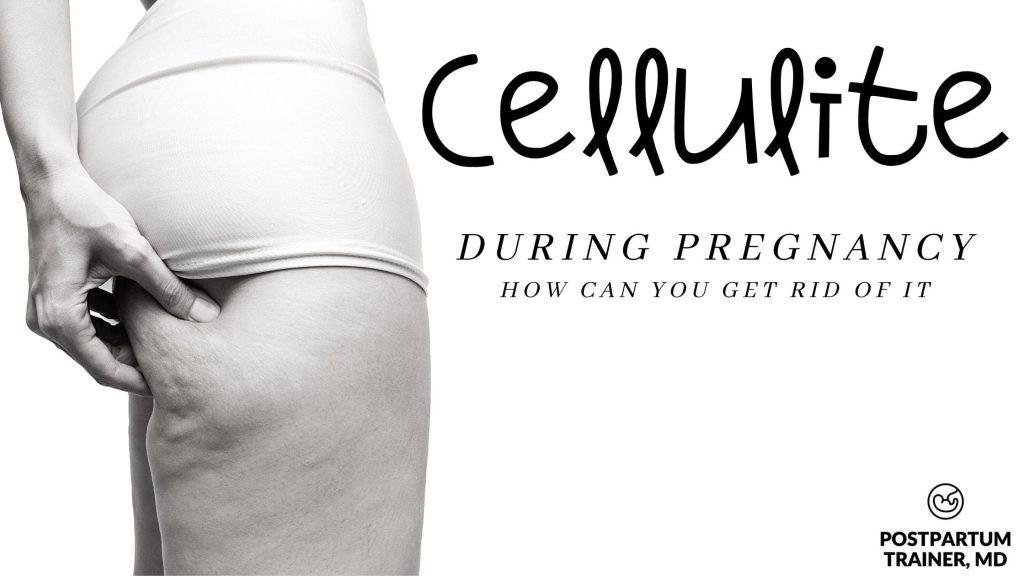
Is it normal to get cellulite during pregnancy?
It is quite common to get cellulite in pregnancy. In fact, some statistics show that at least 80% of women will develop cellulite at some point in their lives.
Pregnancy tends to be one condition that can increase your risk of developing it for several reasons.
I’ll go over those reasons in just a few moments.
What is cellulite?
Cellulite refers to the extrusion or herniation of fat deposits underneath the skin. These deposits can alter the texture of the skin, causing two types of irregularities on the skin.
- An uneven, lumpy-bumpy appearance: People often refer to this type of cellulite as ‘orange peel skin’, ‘lumpy-bumpy skin’, or ‘cottage cheese skin.’
- Skin dimpling: Inward depressions of the skin
Cellulite is commonly seen in areas that have a high presence of fat cells such as:
- the hips,
- the thighs,
- the knees, and
- the abdomen
But it can happen anywhere. As long as there is enough fat present, cellulite can present itself.
But the good news is:
Cellulite isn’t dangerous. You won’t have to worry about it increasing your morbidity or mortality for anything.
With that said, I understand that cellulite can impact your quality of life from an aesthetic point of view.
What Causes Cellulite?
Unfortunately we don’t know the exact causes of cellulite. What we do know is that the development of cellulite is multifactorial.
First and foremost:
Genetics
Genetics will always be the wild card. With all things being equal, some women will develop cellulite, and some won’t.
Unfortunately, there isn’t much you can do about the DNA you inherit.
However, that doesn’t mean all hope is lost.
Lifestyle Factors
Cellulite is also thought to occur from lifestyle factors.
One of those factors is having excessive body fat levels.
This is evident by the fact that some women notice an increase in cellulite during times of weight/fat gain.
This is one of the reasons why pregnancy is a common cause of cellulite.
Another lifestyle factor that has been shown to increase fat formation (aka lipogenesis) is alcohol consumption. (I really hope that you aren’t drinking during your pregnancy, but this is worth mentioning).
Lastly, the food you eat may contribute a role as well.
I’ll go over food in more detail in just a bit.
High Estrogen Levels
Large fluctuations in hormone levels are also thought to contribute to the development of cellulite. Specifically, an increase in estrogen levels.
This is for three major reasons:
Estrogen can lead to water retention (which I will get to in a bit), fibroblast formation (which causes scarring), and fat accumulation.
High levels of estrogen are commonly seen under two physiologic conditions:
- Pregnancy
- Obesity
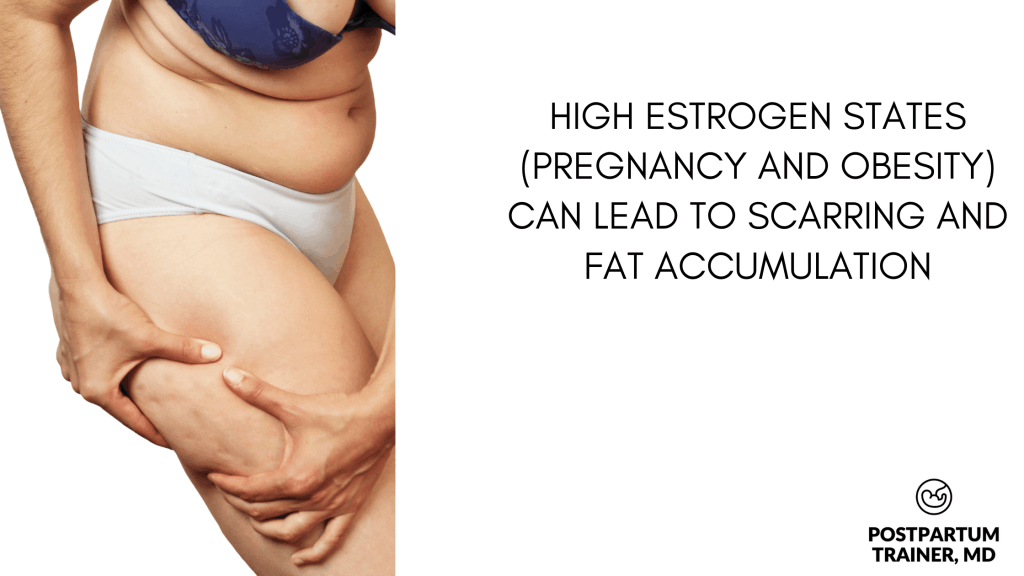
Changes in Collagen/Aging
Increasing age is another potential risk factor for cellulite development. As you get older, you tend to have a decrease in collagen synthesis.
Collagen is an important protein that helps make up the structural component of many tissues.
In fact, the most common forms of collage make up your:
- skin,
- tendons,
- vasculature (blood vessels),
- organs, and
- bones
As collagen is lost – your skin can lose its elasticity and smooth texture, allowing fat depositions to become more obvious.
Water retention
Lastly, water retention is thought to be another precipitator of cellulite formation. Adipose cells can expand with water resorption, stretching the connective tissue and collagen overlying it.
That’s why edema from fluid retention can cause noticeable changes to the appearance of your skin.
In what conditions can water retention occur?
- Pregnancy,
- Obesity, and
- Other chronic conditions such as congestive heart failure, kidney disease, and cirrhosis of the liver
—
So as you can see, cellulite formation can’t be pinpointed to a single cause. However, pregnancy is associated with many of these factors that can cause cellulite formation.
Does cellulite go away after pregnancy?
Cellulite may go away after pregnancy. Many women report improvements in the way their cellulite appears as they return back to pre-pregnancy weight.
Therefore, achieving a normal post-pregnancy body weight can give you the best chance of improving the condition.
I go over strategies you can use in How To Get Rid Of Baby Fat Postpartum.
Can you get rid of cellulite during pregnancy?
So how do you get rid of cellulite? Especially during pregnancy?
Unfortunately, there isn’t a magic bullet treatment that is guaranteed to work.
As you can see, the only thing that you can control are the lifestyle factors. Specifically, trying to control your body fat levels.
With that said, I don’t recommend trying to lose body fat while pregnant.
Instead, you should focus on two things:
#1 Developing Lean Muscle Tissue
Muscle is one of the best markers of overall health in humans. Developing and strengthening your muscle tissue can significantly improve the appearance of your skin and subcutaneous tissue.
The good news is:
It is totally safe to exercise in pregnancy.
However, it is important for you to speak to your healthcare provider before engaging in any type of physical activities.
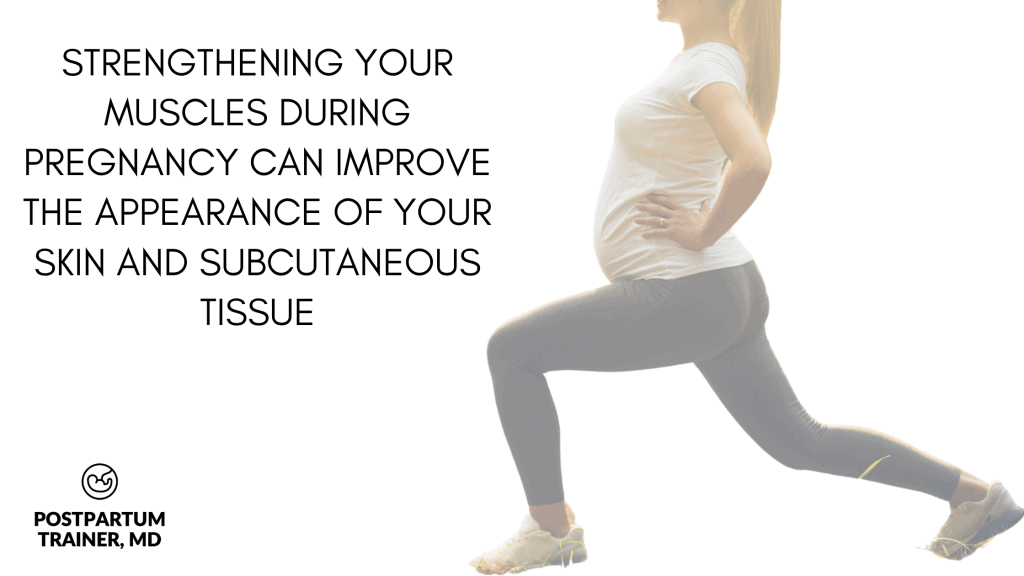
Unless you have a specific contraindication to exercising, your provider will likely give you the green light to do pregnancy-safe physical activity.
So how do you get started?
Let me show you!
Safe Pregnancy workouts
Most women will develop cellulite on their thighs during pregnancy. And I have some good news.
Here are a few articles you may find helpful that go over pregnancy exercises you can do to target cellulite in those troublesome areas:
- How To Exercise Your Inner Thighs During Pregnancy
- How To Exercise Your Outer Thighs During Pregnancy
- 9 Leg Exercises You Can Do In Pregnancy
- 10 Minute Bodyweight Pregnancy Workout
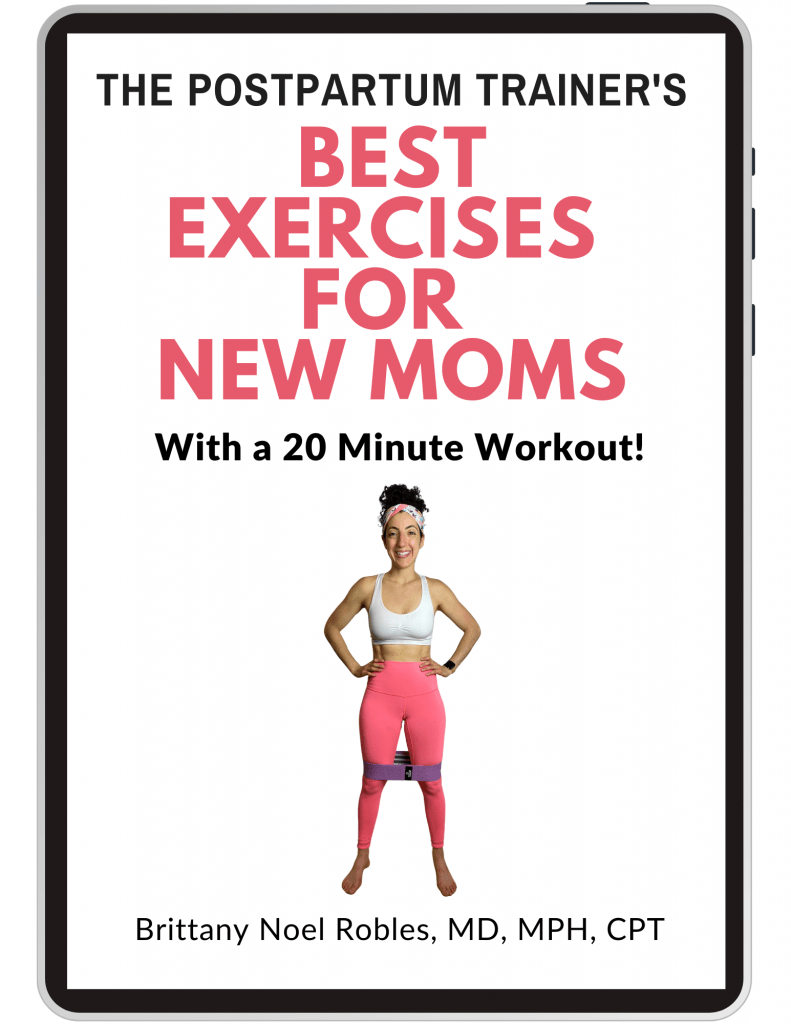
Want A Free PDF of The Best Exercises For New Moms?
There are 9 exercises you can do at home to help rebuild your core, glutes, and pelvic floor safely & effectively. Find out what they are with this 20 minute workout (also included)!
Okay, now let’s go over the second thing you should focus on.
#2 Not Gaining Excessive Weight
This is a lot easier said than done, but it bears repeating. Maintaining a normal rate of weight gain throughout your pregnancy is important for several reasons.
- It decreases your risk of preeclampsia and gestational diabetes
- It decreases your risk of having a macrosomic baby
- It decreases your risk of cesarean section and postpartum hemorrhage
Depending on your pre-pregnancy weight, you should strive to gain no more than 11-40 pounds, total, throughout the 40 weeks of gestation. (11-20 pounds if your BMI is 30 or more, and 30-40 pounds if your BMI is 18 or less).
You should work with your healthcare provider and a nutritionist to create an individualized, healthy pregnancy diet for yourself!
This should include the types of food you should eat more of, and the types of food you should eat less of.
What foods cause cellulite?
So are there any foods that can cause cellulite? Not necessarily. There is no specific type of food that we can definitively say cause cellulite.
With that said, there are certain foods that may increase your risk of cellulite development.
They are the same types of foods that are more likely to cause weight gain.
Specifically, they are:
High calorie foods loaded with sugar and fat, that are hyper-palatable.
You know the kind.
- Junk food
- Pastries
- Fast food
- Fried foods
- etc
These foods taste really good – so it’s easy to overeat them.
The major driving force behind fat gain is excessive calorie consumption.
While it is okay to have these kinds of foods once in a while – do your best to minimize your consumption of them during pregnancy.
In addition, foods that are high in salt could potentially exacerbate the development of cellulite.
Why?
Because salt leads to fluid retention and subsequent edema.
Remember that we talked about water retention as one of the risk factors for worsening the appearance of cellulite.
Are There Any Effective treatments For Cellulite?
So now let’s talk about cellulite treatment.
In the medical literature, there are a lot of studies comparing different types of treatments with varying levels of efficacy.
The most common forms of treatment mentioned include
- Topical creams
- Lymphatic drainage
- Acoustic wave massage
- Laser lipolysis
- Carboxytherapy
- Subcision
- Surgery
By and large, a lot of these treatment methods aren’t proven to be effective. Some patients experience temporary improvement of their cellulite – but it is of short duration.
In fact, many of these treatments should be avoided at all costs during pregnancy. There are limited data to demonstrate their effectiveness, and no data to support their safety in pregnancy either.
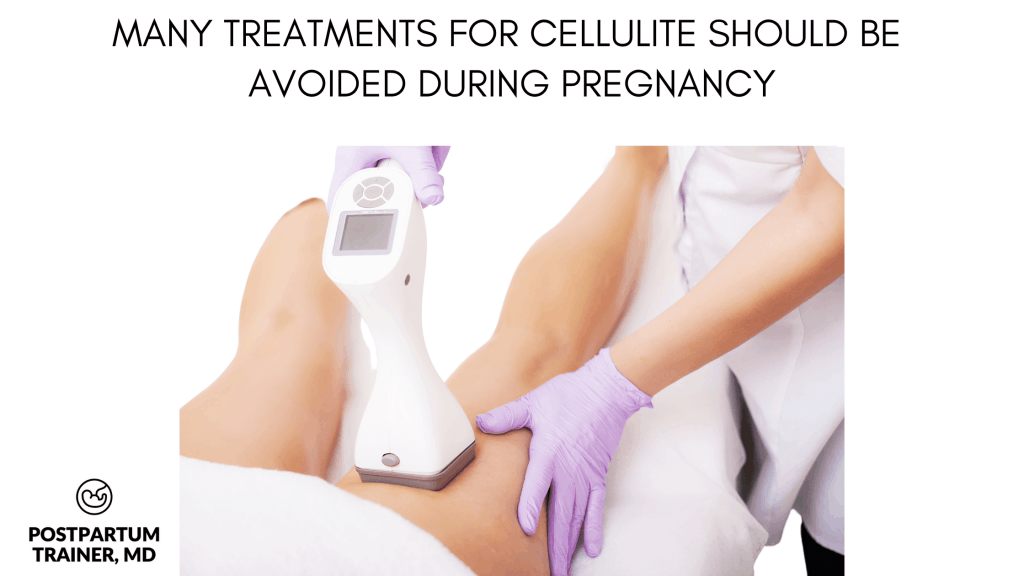
The absolute safest treatment during pregnancy is…
Living a healthy lifestyle!
It does not matter if you are contemplating pregnancy, pregnant, or postpartum.
Start taking care of your body, and it will take care of you!
Related Questions
How Do I Target Cellulite On My Belly?
Unfortunately, there is no direct way to target cellulite on your stomach/belly, especially not during pregnancy.
Belly fat is lost through two ways:
- Improving your nutrition, and
- Losing body fat levels
I don’t recommend that you lose body fat during pregnancy, but I highly recommend that you improve your nutrition!
Does Cellulite Go Away With Breastfeeding?
Breastfeeding is great for helping you get back to your pre-pregnancy weight, but breastfeeding by itself won’t make cellulite go away.
That’s because breastfeeding burns calories!
And by burning calories – it is likely that you will burn some fat. To
With that said, it is always important to do three things:
Live a healthy lifestyle, maintain normal body weight, and do some resistance training!
Does Drinking Water Help Cellulite?
Maintaining good levels of hydration could potentially help with cellulite.
This all ties back into maintaining a healthy lifestyle.
If you do not drink enough water, you will likely become dehydrated during pregnancy. This can lead to fatigue, water retention, and uterine cramping.
Increasing your water intake may help improve skin turgor and make your connective tissue more supple.
How much water should you drink?
Until your urine is a pale yellow color at all times.
Final Words On Cellulite and Pregnancy
Cellulite is an extremely common condition that affects over 80% of women.
While we don’t know the exact cause of it, we do know that there are many factors that contribute to it’s development.
Pregnancy is a time where your body experiences many changes- some of which can induce the appearance of cellulite.
But you can do your part in staying active during your pregnancy, and maintaining a normal bodyweight.
Even if you don’t get rid of cellulite during pregnancy, at least you have improved your fitness – which is priceless!
Now I want to hear from you.
Did you develop cellulite during your pregnancy? What did you do about it?
Did it go away postpartum?
Comment below and let me know!
Related Articles To Cellulite During Pregnancy
- How To Get In Shape While Pregnant
- 3 Ways To Get Rid of Baby Fat Postpartum
- Losing Fat While Pregnant- [Can It Be Done Safely?]
Get Four Free Workouts To Help Strengthen Your Pelvic Floor & Heal Your Mommy Tummy!

Brittany Robles, MD, MPH, CPT
Brittany Robles is a full-time OBGYN physician, a NASM certified trainer, and a prenatal and postnatal fitness specialist. She holds a Master of Public Health degree in maternal health with a special interest in exercise and nutrition. She is also the co-author of The White Coat Trainer. Learn more about her here.
Sharing is Caring – Send This To A Mom In Need!

Thanks so much for this info! I unfortunately got way too much cellulite and flabbiness while pregnant even though I didn’t gain a lot! I was wondering if you knew of ant cellulite treatment safe while nursing? Thanks!
Hi Becca,
Thank you so much for your comment.
Getting rid of cellulite can be quite hard and a lot of the treatments out there aren’t proven to be effective.
The best thing you could do is improve your nutrition, exercise, and try to decrease your body fat.